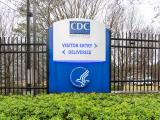May 20, 2003 (CIDRAP News) – The United States remains underinvested in public health even though terrorism and new diseases like SARS (severe acute respiratory syndrome) have raised the public health system's profile, the nation's top disease-prevention leader told public health graduates at the University of Minnesota yesterday.
Julie L. Gerberding, MD, director of the Centers for Disease Control and Prevention (CDC), said in her commencement speech that in the face of challenges ranging from bioterrorism to epidemic obesity, the need for a strong public health system is as urgent as it has ever been.
"We are desperate at all levels for talented people with the skills and the capabilities that you bring to the forefront," Gerberding said at the commencement ceremony for the university's School of Public Health, held at the McNamara Alumni Center, Minneapolis.
Gerberding cited a lengthy list of public health problems facing the nation: emerging infectious diseases like SARS, the AIDS epidemic, antibiotic-resistant bacteria, the threat of terrorism, chronic diseases like cardiovascular disease and cancer, and disparities in healthcare availability and quality.
Stressing the burden of chronic diseases, she observed that cardiovascular disease and stroke are the leading cause of death in the US, followed by cancer and chronic lung disease. "But if you look at this from an epidemiologic perspective you realize that the actual No. 1 cause of death is tobacco use," she said. "The second actual cause of death is lack of physical fitness, overeating, and obesity." Sixty-one percent of Americans are overweight, and 15% of children are severely overweight, she added.
In the face of all this, "We remain underinvested and underengaged in public health," she said. "Most Americans truly do not know they have a public health system, and they don't know what it does, and they don't understand why it matters."
On the other hand, the anthrax attacks in 2001 and the battles with West Nile virus and SARS have focused attention on public health, she said. "I know there's no silver lining to anthrax, but at least it made the public health system visible to a lot of people who didn't know we existed."
Concerning SARS, she continued, "Our nation recognizes that it is the public health system that has people at the borders of our country who have handed out more than 1 million alerts to arriving travelers. . . . This public health front-line force is in my view what has allowed us to contain this epidemic. It's not us academics or those of us in Atlanta. It’s the people on the front edge of the public health system who are there recognizing the symptoms of SARS, making sure people who have symptoms are isolated in hospitals with proper infection control, and ensuring their contacts are identified, alerted, and actively monitored."
Gerberding presented a list of qualities needed to invigorate public health and called on the graduates to consider which ones they can offer. All the qualities were represented by words beginning with i:
- Intolerance—refusal to accept health disparities and inequities
- Impertinence—a willingness to challenge public health dogmas
- Intelligence—the capacity to "get out in the real world and understand what's needed, what do people want, what's missing, what are their dreams"
- Innovation—the inclination to invite and consider new ideas
- Integration—connecting the public health system with the healthcare system, laboratory specialists with front-line health workers, and the public sector with the private sector
- Instigation—bringing together "the critical mass of action-oriented people who will get the ball rolling"
- Impatience—the opposite of complacency, which is "the enemy of public health"
- Ingenuity—the ability to creatively market public health
- Investment—recognition of the need for public health funding, such as the "unprecedented" plan to spend $135 million on chronic-disease prevention in fiscal year 2004
- Inspiration—the "capacity to inspire, excite, and engage people and the leadership to make this all happen"
Telling the graduates that leadership is a skill that can be developed like any other, Gerberding urged them to create a vision to inspire others. "I know that you can make a difference, I know that you will make a difference," she said.



















